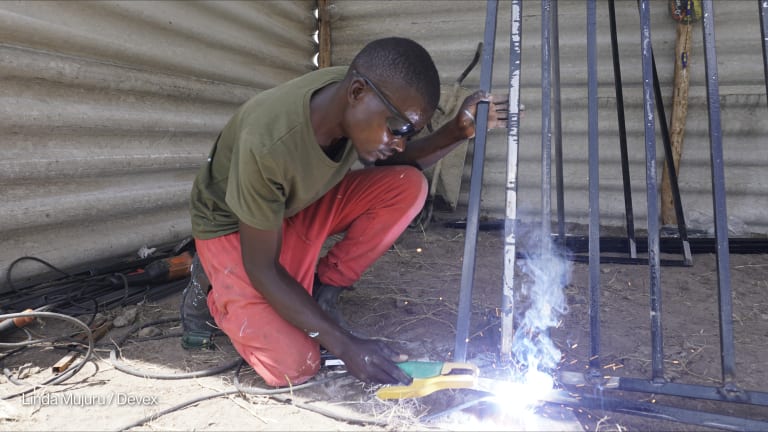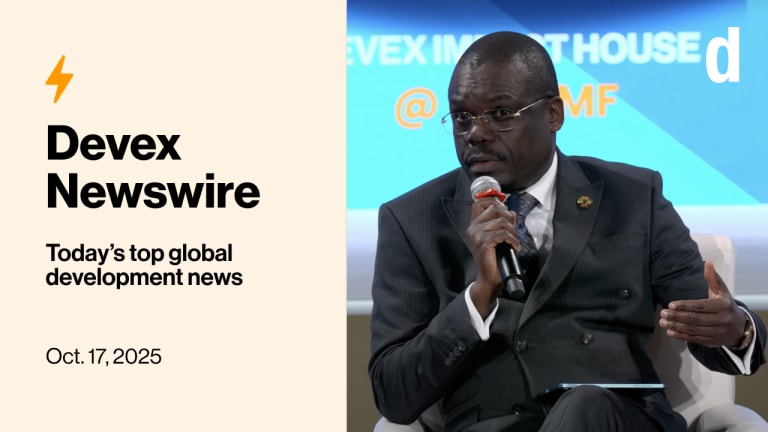
Online volunteering is paving the way for a new generation of young humanitarians while helping the International Federation of Red Cross and Red Crescent Societies stay relevant, says Bas van Rossum, the aid organization’s global youth president and a member of its governing board.
Increasingly, people are reaching out for help online, and communities must be met where they are, he told Devex on the sidelines of the 77th United Nations General Assembly in New York City. “If we're not present in the digital space, then we will not hear them and we will not be able to cater for their needs, and then … we run the risk of the IFRC becoming obsolete.”
Online volunteers can bridge that gap by working with IFRC to offer online counseling for young people, help in organizing responses, and update maps for use in crises. Responding to a crisis digitally appeals to younger people in particular, van Rossum said.
“You don't always have to be [there] in person. That removes those thresholds for young people to engage in society and to do it from the comfort of their house, in a place where they feel comfortable, safe,” he said. “It's a much younger crowd indeed that is really keen to achieve impact, see impact, and feel that they are contributing immediately.”
IFRC’s operations are propped up by the support of around 15 million volunteers globally, half of which are young people — what IFRC considers those under 30.
“In an emergency crisis, you have to be a bit older, say 16 and up, but if you want to do something in your community, you can start from the age of 12 or 13. That’s dependent on legislation in the country,” van Rossum said.
According to IFRC, young people can be “agents of change with the power to address global humanitarian challenges relevant to their local communities.”
Devex spoke to van Rossum about what online volunteering entails, why it appeals to young people in particular, and how other organizations can engage youth in this way.
This conversation has been edited for length and clarity.
What does online volunteering during a time of crisis look like?
It depends on the country, but we do quite a lot of counseling online as we believe very much in a peer-to-peer approach. … We do a light assessment and say “Hey, maybe you should talk to a professional or talk to some of our staff who are more trained.” This low threshold means you don’t … have to go to the doctor, but [can] just have a conversation with another young person from the Red Cross who … will guide [you] further. To do all of that online has been very helpful.
In the ongoing refugee crisis around Ukraine, we have a lot of people volunteering online with the Polish Red Cross. … We're also mobilizing volunteers from Ukrainian descent who are in the Netherlands or France and can help our operations in Poland through online means. … They can help us in meetings, on telephone lines, with online registration, and with translating as well.
“If we're not present in the digital space, then we will not hear them and we will not be able to cater for their needs, and then … we run the risk of the IFRC becoming obsolete.”
— Bas van Rossum, global youth president, IFRCWhat we also noticed in times of crisis is that maps are very important [but] outdated. … A map looks different because bridges have been destroyed or roads have been flooded. You want to make sure that you have the most up-to-date map. What we do with digital volunteering is have young people continuously updating maps.
They look at what this is like from Google Maps’ satellite view and indicate “This is a road, this is a major road, this is a medium road, this is a small road, this is a house.” … We try to do that for the entire world, but we prioritize locations vulnerable to crises, particularly natural disasters. You can do that on a Sunday night online, you can do it for 15 minutes, or you can do it for three hours. To build that community, we have many universities host pizza parties where [students] map together.
What are the challenges in engaging youth in online volunteering?
It can sometimes feel a bit transactional. If you're part of a Red Cross community, you're [usually] at the branch or together with the youth group [and] you feel part of that group. [With online volunteering] it's similar to people who onboarded a new job during the COVID-19 crisis: You open your laptop, you close your laptop, and you don't feel part of the organization. That [applies to] us at IFRC as well. How can we make sure that our volunteering is not transactional but makes [volunteers] feel part of the wider community?
What we know resonates very much with young people in a number of countries — including the Netherlands and Austria — is that we have flexible volunteering where people can say ‘I don't want to volunteer every week with the Red Cross, I can't do programs every week for years and years, but you can count on me whenever disaster strikes.’ In the Netherlands, we have around 100,000 flexible volunteers.
We also have this system called Netherlands Ready to Help, where an app shows your daily shifts, where to sign up, and what you can do. We also have a system where, in times of emergency, with one press of a button, it takes an automatic sample and [sends an] automatic call to say “This crisis has hit, we need help here and here, please press one to confirm your attendance.” Ten percent might be in the position to actually go and that is enough. It mobilizes people really quickly.
An example right now is with the [Ukraine] refugee crisis and the frequent opening up and closing down of our shelters. We have a lot of emergency shelters that have to be opened up in four hours. They're often there for three days until a permanent place is found and then they need to be closed within three hours. Everything has to be set up, organized, and cleaned. That's the type of thing where we quickly need people to help us. So it's not digital volunteering per se, but we reached out to them in a digital way.
Would you have any advice for other organizations about how to engage youth as digital volunteers as part of their humanitarian response?
I think it's important to listen to young people and to ask “What can you do?” so that we don't prescribe limited options. Say “Hey, this is the challenge we're having, this is the task that we have at hand, what can you provide from your position and what can you do online?”
I think we [should] make them co-owners of these programs. [This] is important and opens up our own views because we might have a very narrow view about how certain things can get done. Young people are very creative in getting things done as long as we let them. It’s important to be open-minded in our programs to be open to the idea that some things can be done digitally.
Nothing has to be done in the way it has always been done. But in times of crisis, it's easy to opt for the way you have always done things because it needs to be right the first time, otherwise you risk people dying. Sometimes [there’s] reluctance to innovation or change but it's important that we still push it, otherwise our operations will become more and more ineffective and the organization will become obsolete.
Visit the Generation Why series for more coverage on how we can ensure the digital space advances the rights of all young people and leaves no one behind. You can join the conversation using the hashtags #DevexSeries on #DigitalRights.









